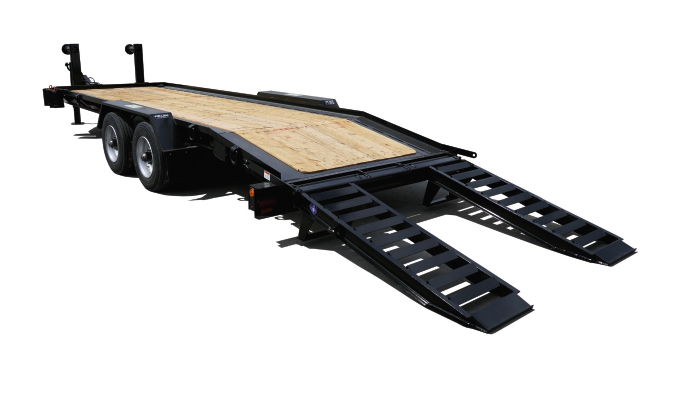Hauling heavy equipment is a serious business. It’s important to factor in weight and safety when considering a new trailer. It’s also important to pick a trailer that is the perfect fit for your job, whether that means buying a trailer off the show floor or having experts design a custom one. Nathan Uphus of Felling Trailers shares his insight on hauling considerations when buying a trailer, trailer options from Felling Trailers, and more.
MWS: THIS MONTH’S ISSUE IS ABOUT HEAVY HAULERS, BUT YOU CAN’T HAUL WITHOUT A TRAILER. HOW IMPORTANT IS IT TO PICK THE RIGHT TRAILER FOR THE JOB OR DOES TRAILER SELECTION REALLY MATTER?
UPHUS: It’s extremely important to consider the equipment hauled when configuring a trailer. There are size and weight limits that need to be factored in. Exceeding federal or state legal weight or dimensional criteria will result in the need to permit the load. A permitted load would be considered anything overweight (80,000 lbs gross based on federal regulations), or over dimensional (exceeds 102-inches wide / 13-ft 6-inches tall / 65-ft to 75-ft overall length, depending on state). The weight and physical dimensions of the equipment itself along with the combination of the truck and trailer are all going to dictate what type of trailer is needed to be legal for that specific load case.
MWS: DRIVER AND OPERATOR SAFETY IS SO IMPORTANT. HOW CAN OPERATORS ENSURE THE SAFEST EQUIPMENT TRANSPORT WITH THEIR TRAILERS?
UPHUS: It’s important to ensure that the trailer being used is rated to carry the equipment it’s hauling. It’s ideal if the trailer is not loaded to its maximum-rated capacity. There are always unforeseen circumstances that can contribute to added stresses on the trailer’s structure and its components, i.e., poor road surface conditions, dynamic stresses, etc. Another very important contribution to safety is for the operator to perform a routine walk around inspection before towing. Verify that the equipment is properly secured to the trailer using the recommended type, size, and quantity of tie-downs, and ensure that the trailer and its components are within safe operating specifications. Felling has built many trailers with operator safety in mind, not necessarily limited to towing safety, such as multi-point step and grab handle options to assist in safe access to the deck, non-skid traction coated walking surfaces, and DOT approved fixed tie-down provisions in set locations for hauling specific equipment to name a few.
MWS: WHAT MAKES THE FOLKS AT FELLING TRAILERS “TRAILER EXPERTS” AND HOW DOES THAT HELP PROSPECTIVE CUSTOMERS LOOKING FOR A NEW HEAVY HAUL TRAILER?
UPHUS: We at Felling Trailers consider ourselves trailer experts because of our real-world experience that many of our team members possess. A good majority of our team has experience in pulling trailers and hauling equipment. Others have worked in the capacity of building and/or maintaining trailers. Some started out with Felling in production or in parts and service roles. All this added knowledge contributes to a solid understanding of how a trailer is constructed, loaded, and towed for the best and safest possible results.
MWS: THE BULK OF OUR READERSHIP WORKS IN CONSTRUCTION. WHAT KIND OF CONSTRUCTION EQUIPMENT TRAILERS DOES FELLING TRAILERS OFFER?
UPHUS: Felling Trailers currently offers upwards of 220 different models, designed and built to haul a wide variety of equipment with capacities ranging between 3,000 lbs all the way up to 120,000 lbs. In addition to equipment trailers, we manufacture models for more specialized markets such as utility industry, underground directional drilling, and trailers for mobile power generation and load bank applications, along with the rental industry. We continually promote ourselves as one of the most diverse trailer manufacturers.
MWS: FELLING TRAILERS OFFERS CUSTOM SOLUTIONS. HOW CUSTOM ARE WE TALKING?
UPHUS: We’ve built several very custom trailers over the years that few manufacturers would even quote. Some of these projects are completely one-off “floor built” models, others are fully designed and engineered to perform a specific task or haul a specialized piece of equipment. One example that comes to mind, we worked closely with a customer and our engineering department to develop a 25-ton three-axle air brake trailer with a very custom hitch and a multi-level equipment mounting pedestal and attachment point layout for the rail industry. The machine was designed to crawl from the trailer to the top of an open top rail car, then from car to car to unload scrap metal. Pictures of some of our past custom builds can be found on our website.
MWS: IT SEEMS NO ONE CAN ESCAPE SUPPLY CHAIN ISSUES THESE DAYS. IF A READER NEEDS A TRAILER TODAY, HOW SOON CAN THEY RECEIVE IT? HOW SOON COULD THEY RECEIVE A CUSTOM TRAILER?
UPHUS: We have multiple production lines building models ranging in capacity. There are several factors that contribute to the lead time, the largest factor currently being demand. We’ve seen a tremendous amount of demand with most of our lines. The lead times of these lines range anywhere between 55 weeks to 104 weeks. There are instances where the supply chain affects orders even that far out. Trailers with certain hydraulic components or custom suspensions have seen the longest delays. With custom trailers, it really depends on the overall complexity when it comes to lead time. Custom models can range anywhere from 76 weeks to 120 weeks, again depending on the overall complexity.

FOR MORE INFORMATION
Nathan Uphus is a sales manager at Felling Trailers. Nathan has been with Felling Trailers for over 23 years. He joined the company as part of the production team and through his time there has worked his way to the role of sales manager for the company. Find out more, visit www.felling.com.




